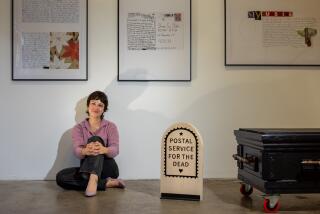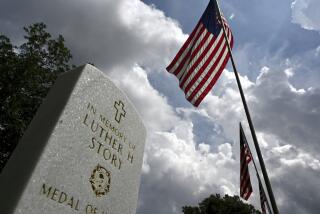Family Shares Anguish Over an American GI Missing in the Korean War
SCOTTDALE, Pa. — In the summer of 1950, an old man from Allison’s News Store interrupted the play of 8-year-old Buck Skero.
“Hey, do you know where the Skeros live?”
“Yes, I’m a Skero. I only live right up there.”
“I have a telegram for them.”
The boy led the Western Union man into the house.
“Mom, there’s somebody here to see you.”
The messenger handed her the telegram.
“Oh, my God, why Chuckie?” cried Mary Skero, collapsing on the couch.
Her eldest son was missing in the Korean War. She would never see him again; though others gave up hope in the decades that followed, she did not.
“Mary, why don’t you have a funeral Mass for him?” friends asked her.
“No,” she said, “because he’s not dead.”
*
Forty-two years later, at 9:30 p.m. last June 24, as 50-year-old Buck Skero stepped from the shower and was getting ready for bed, the telephone rang in his Sharon, Pa., home. His niece, Ellen Skero, was on the line from her home in Newton Falls, Ohio.
“Uncle Buck, Uncle Chuck’s name is in the USA Today paper.”
Buck Skero quickly dressed, got into his car and drove two blocks to the minimart, his heart pounding. He got a paper and looked at it even before leaving the store.
“There it was,” he said.
Charles M. Skero.
His name was on an official list--released by the vice chairman of the Senate’s POW-MIA Affairs Committee--of 125 Korean War soldiers who were reportedly interrogated by the Soviet Union in North Korea and possibly transferred to China.
After Buck Skero showed the newspaper to his wife, he went off alone.
“I just sat there dumbfounded. I started bawling. It overwhelmed me to see that. I was overwhelmed with emotion about it.”
He called his sister Doss that night.
“Are you sitting down?”
“No.”
“Well then, sit down. Our brother might still be alive.”
Together, they cried.
“What else would you do?” said Buck. “You had no words. You can’t say anything, it’s so overwhelming.”
It was, in fact, an echo from a distant era, from a war that has been overshadowed by another Asian conflict. In their obsession with prisoners of war and missing in action from the Vietnam War, many have forgotten that American soldiers also disappeared in the morass of Korea.
But not the Skero family.
They, like other families of Korean War MIAs, are to some extent locked in the world of the late 1940s and early ‘50s; the rest of the country has moved on, but they cannot let go of a time when their families were whole.
In those days, the coke ovens lit up the night skies, the railroad ran by your home and the engineers waved at you.
The Skeros had no car. They didn’t even have a telephone. No need to lock your doors when you went away for a weekend or a week. Walk into a neighbor’s home and it was like your own. Everyone grew up together, the Poles and Slavs in this mostly Catholic coal-mining community.
Chuck had white hair, and everyone called him Towhead. Doss, or Dolores, was a year younger. Then came Kenneth and Bernard, known to all as Buck.
Mary Skero signed for Chuck to enlist--he was only 16 when he dropped out of his sophomore year of high school. He re-enlisted in 1948 because he liked the Army and wanted to return to Japan.
In the spring of 1948, Chuckie Skero hitchhiked from his Army post in Indiantown Gap to Standard Shaft, the coal-mining town where the family lived. From there, he walked 6 miles to his sister’s high school to bring her the $17 he had saved in bus fare for her class ring.
The next year, Chuck brought 8-year-old Buck a brown dog they called Brownie. Buck remembers sleeping in the same bed with Chuckie, his older brother tickling him and laughing with him.
That same summer, Doss awakened at 4 a.m. one morning to Chuckie’s footsteps running down the sidewalk to catch a ride to the train station. She heard the car door slam and he was gone.
*
The last letter the family received from Chuckie was dated July 5, 1950, and its words are imprinted in Doss’ memory. “I can remember it as plain as ever because I was to get married in September and I can remember him writing my name saying, ‘Mom, do you allow her to get married?’ ”
Their mother kept torturing herself by reading the letter over and over, crying each time. It was the last link to her son, along with a few personal things the Army shipped her in a carton on Nov. 15, 1951:
A nameplate, a brass buckle, three sweat shirts, a T-shirt, three towels, a bathmat, a razor, a hairbrush, a comb and two shoe brushes. Chuckie always kept a glow on his shoes. “How do you like the shoeshine?” he wrote on the back of a snapshot with some Army buddies in 1948.
“Our mother was sick for months over this,” said Buck. “She ended up in the hospital right after it. She just totally fell apart.”
Doss burned the last letter; her mother was dwelling on it too much. “I threw it in the furnace. I figured out of sight, out of mind.”
Chuckie was officially declared dead in June, 1954, but the family received no immediate death benefits from the Army. His father had been laid off from the mines, and his mother went to work in the kitchen of a Holiday Inn.
Only years later did the Skeros begin receiving Army benefits, and at that, only $40 a month. Eventually, it increased to $75 a month.
“I remember one time a lady had said to Mother, ‘You’re taking blood mon” said Doss. “That bothered me. I never forgot it.”
Her mother died in 1975, of cancer. Two years ago, the government cut her father off with no explanation. “My dad didn’t want me to question it,” said Doss. “He said, ‘Leave it alone.’ ”
Last October, Buck asked the Army for medals to replace the ones his brother had received. The Army told him it would cost $9.80, but later sent them at no cost after his congressman protested on his behalf.
“We’ve never had an officer come to the house,” said Buck, angrily. “We’ve never received a flag. We’ve never had anybody officially come up and say, ‘Mr. Skero,’ like to my dad, or our family, ‘Your son is dead.’ ”
And then, in 1992, Chuckie Skero’s name surfaced on the MIA list.
Sen. Bob Smith (R-N.H.), vice chairman of the Senate’s POW-MIA Affairs Committee, said the list was handed to him by a prominent Russian official during a visit to the Soviet Union. He would not identify the official.
“Why was it put in the paper before the families were officially notified?” asked Buck.
“We had no way of contacting the families,” said Smith. “There were no up-to-date records on any of these people. They had not been followed. It was so long ago. . . .
“Even though we knew it would be painful, we felt it was worth the chance to have the families give us some feedback so we could check and verify the credibility of the information we have.”
Smith traveled to North Korea in December. He said he was told by North Korean officials that the Communist Chinese army ran U.S. prisoner of war camps in both North Korea and Manchuria in northern China during the war.
“North Korean officials confirmed that some war propaganda photos showing hundreds of American POWs were actually taken in China, not North Korea,” Smith said. “We were told that the Chinese know what happened to those American POWs held in Manchuria during the war who were never returned.”
Smith said he expects the State Department to press China for the answers that Buck Skero and scores of other families seek.
Chinese officials called Smith’s statements groundless; they said China never received any of the 125 soldiers on Smith’s list.
*
The Skeros were notified by letter in 1954 that Chuckie died of malnutrition, based on interrogations of other POWs who were released. Now Buck Skero pressed the Army for more information. For the first time, the Army sent him what it said was his brother’s entire file.
In an official letter July 1, the Army said there is nothing in Chuckie Skero’s file to substantiate the report that he was interrogated by the Soviets and possibly transferred to China.
There was Delbert Chance, 62, of Newfield, N.J., who said he was held in North Korea with Chuckie Skero for 10 months in a “death shack” for POWs expected to die. He said the North Koreans beat them with clubs.
The POWs were fed only a bowl of rice a day. Chance and Skero shared the same brass spoon. In remembrance, Chance brought out that spoon and gave it to Buck Skero last year after Skero contacted him.
“We were so thin, Chuck and I used to have to help each other to get up,” said Chance. “He weighed about 80 pounds. If somebody died, we would get the body and prop it up in sitting position, hoping the guards would figure the guy is still alive and send in a portion of rice. That’s how we used to get extra rice.”
And there was Christopher McAndrews, 62, of Jackson, N.J. Sadly, he recalls slipping through the dusk past North Korean farmhouses into the hills, escorted by a Korean guard.
And there, on a hillside, he dug a shallow grave and buried Chuckie Skero.
More to Read
Sign up for Essential California
The most important California stories and recommendations in your inbox every morning.
You may occasionally receive promotional content from the Los Angeles Times.










